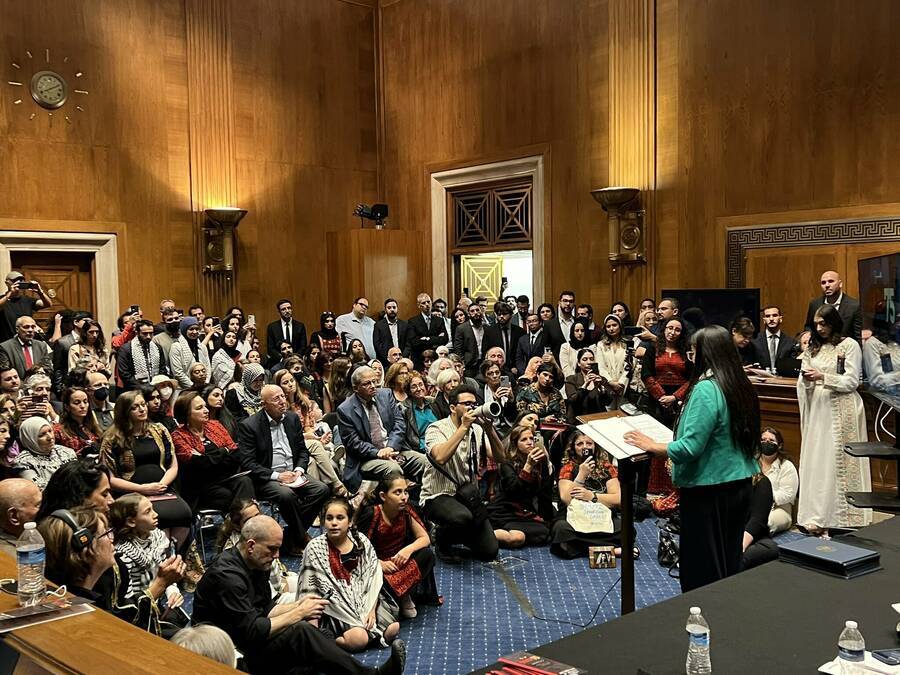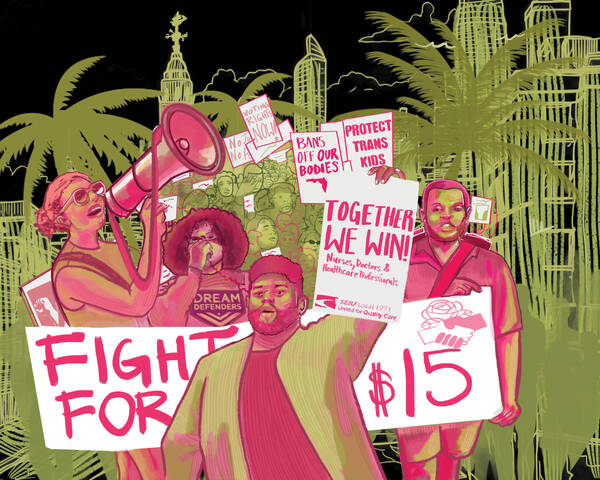How Would You Feel, Senator Rosen?
Jewish responses to a recent event commemorating the Nakba reveal a communal narcissism, which sees Palestinians’ very identity as being first and foremost about Jews.

Rep. Rashid Tlaib addresses a packed room at an event about the 75th anniversary of the Nakba, May 10.
A few years ago, over Shabbat dinner with a childhood friend, I had a memorable conversation about the Palestinian flag. On her way home from work that week, my friend had driven past a Palestinian cultural event where attendees carried the flag aloft. She was agitated by the scene, and particularly by the flag, which to her seemed a symbol of aggression against her as an Israeli American. “But they’re Palestinian,” I countered. “What flag are they supposed to fly to represent their collective story?” It was a basic observation, so I was surprised at the length of her pause as she thought it through. “Huh,” she said, casually. “I’ve never thought about what it might mean for them.”
I recalled this conversation yesterday when Speaker Kevin McCarthy, following a letter from the Anti-Defamation League (ADL), barred Palestinian American Rep. Rashida Tlaib from holding a Nakba Day event at the Capitol. The event—meant to mark the 75th anniversary of the Nakba, or “catastrophe,” in which hundreds of thousands of Palestinians were expelled from their homes by Zionist forces—was ultimately salvaged when Sen. Bernie Sanders offered the hearing room of a committee he chairs as an alternative venue. In response to the event, Sen. Jacky Rosen, who is a co-chair of the Senate Bipartisan Task Force for Combating Antisemitism, told Jewish Insider that “calling the establishment of the world’s only Jewish state a ‘catastrophe’ is deeply offensive.”
Rosen’s quip seemed to echo my friend’s feelings about the Palestinian flag: In both cases, expressions of Palestinian identity were read as being first and foremost about Jews. As the (Jewish) story underlying this structure of feeling goes: The Palestinians could have welcomed us in Palestine; they could have accepted the partition offered by the United Nations, but they chose to start a war. And now, they are using our justified response to garner sympathy on the world stage while pursuing their original goal of driving us into the sea.
There are multiple problems with this story. For one thing, it’s historically misleading, as Peter Beinart breaks down in his 2021 piece, “Teshuvah: A Jewish Case for Palestinian Refugee Return.” Even though the Israelis accepted partition, they did not accept the existence of the Arabs who made up almost half the population of their new territory; there could be no Jewish-majority state without a mass transfer of the non-Jewish civilian population. That is precisely what followed: an 18-month campaign in which Zionist forces drove over 700,000 Palestinians from their homes and emptied more than 400 Palestinian villages. Moreover, as Elisheva Goldberg meticulously catalogs in her 2020 report “Road to Nowhere,” when displaced Palestinians tried to return to their homes after the violence subsided, many found their lands expropriated and became internal refugees within Israel.
Almost all historians of the region, including Israeli ones, agree on the basics of this story, but its retelling nevertheless provokes an anxiety that, as Stefanie Fox of Jewish Voice for Peace points out, parallels white uneasiness with the teaching of Black history in America. Indeed, Jewish discomfort with the Nakba facilitates a broader inability to see both history—and present circumstances—clearly. In their insistence that Palestinians rejected them as Jews, many completely overlook the fact that the World Zionist Congress, the Jewish National Fund, and other Zionist actors did not seek to live alongside their Arab neighbors as equals—they wanted (and built) a sovereign Jewish state that privileged Jews. Why would the Arabs already living in Palestine, who had their own language and culture and institutions, their own way of life, want to become second-class citizens in a Jewish state? Surely there was a simpler motivation than “antisemitism” in their attempts to stop this from happening. Likewise, today, antisemitism may not top the list of reasons why Palestinians organize for their freedom—the lack of freedom may be the more salient impetus. As Kaleem Hawa writes in his poignant 2021 essay “The Nakba Demands Justice,” Palestinian liberation struggles, past and present, are not aimed at destroying Israel so much as creating “a world in which the destruction of Arab life is no longer permitted.”
As Palestinians’ stories have become more visible in mainstream media, we are seeing an even stronger pushback from Israel-advocacy organizations on Palestinian speech. This is not just an American phenomenon. In Germany, for example, the Berlin police have continued to ban Palestinian assembly, including last year’s Nakba Day protests, for fear of hateful and antisemitic rhetoric—a rationale that sounds strikingly similar to that of the ADL in their letter asking McCarthy to cancel Tlaib’s event. As the fear of antisemitism is leveraged to preemptively repress speech, Palestinians are watching as their very identity—their stories, their symbols—become taboo, turned wholesale into expressions of anti-Jewish sentiment.
Though there’s considerable psychological debate around the term, I’ve always understood narcissism as an inability to assimilate the fact of other people, to understand that others have feelings and thoughts and experiences that aren’t mediated through your own. The Jewish communal mindset as it relates to Palestine seems evidence of a collective narcissism, an utter failure of empathy and imagination. It is an old malaise, and one that has long plagued American Jews—even those on the left, as Dorothy M. Zellner records in her 2021 article “What We Did: How the Jewish Communist Left Failed the Palestinian Cause.” “Given our people’s near-extermination in Europe,” she writes, “I’ve wondered if I may be holding the Jewish Communist left to an impossibly high standard by insisting that they should have stood up for someone else in that era.” But the passage of time doesn’t seem to have made empathy any easier.
I wonder if Sen. Rosen has ever spoken with Rep. Tlaib. Does she know that Israel has barred Tlaib from visiting her elderly grandmother in the occupied West Bank? Has Rosen watched Tlaib’s tearful speech on the House floor amid yet another bombing campaign in Gaza almost exactly two years ago? If you haven’t seen it, I urge you to watch it now. Tlaib begins by remarking on how absurd it is that some of her colleagues “dispute the truth about segregation, racism and violence in Israel towards Palestinians” by telling her “that I need to know the history.” “What they mean,” she says, “is that Palestinians do not have the right to tell the truth about what happened to them during the founding of Israel.” Again and again throughout the speech, she asks her colleagues: How would you feel? How would you feel if teargas and stun grenades were tossed into one of your holiest places during one of your holiest days? How would you feel if you had to go through humiliating checkpoints to get from your own home to the doctors office, or to see your family? How would you feel if you had to wait at those checkpoints while pregnant, in the scorching heat, under the narrowed eyes of soldiers with guns? Well, Sen. Rosen, how would you feel?
It may seem as though I’m suggesting that this kind of imagining is easy. Personally—and I’m not proud of this—it took seeing this reality for myself to fully grasp its contours, to begin to be able to embark on this thought experiment in earnest. I don’t suppose that Sen. Rosen, whose family has been in the United States for generations and who has never known the obscene confinement that defines Palestinians’ everyday life, should have an easy time of it. But this is why it takes a special kind of chutzpah to declare herself the offended party.
Arielle Angel is the editor-in-chief of Jewish Currents.

